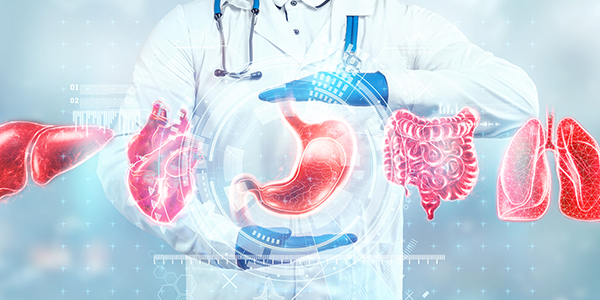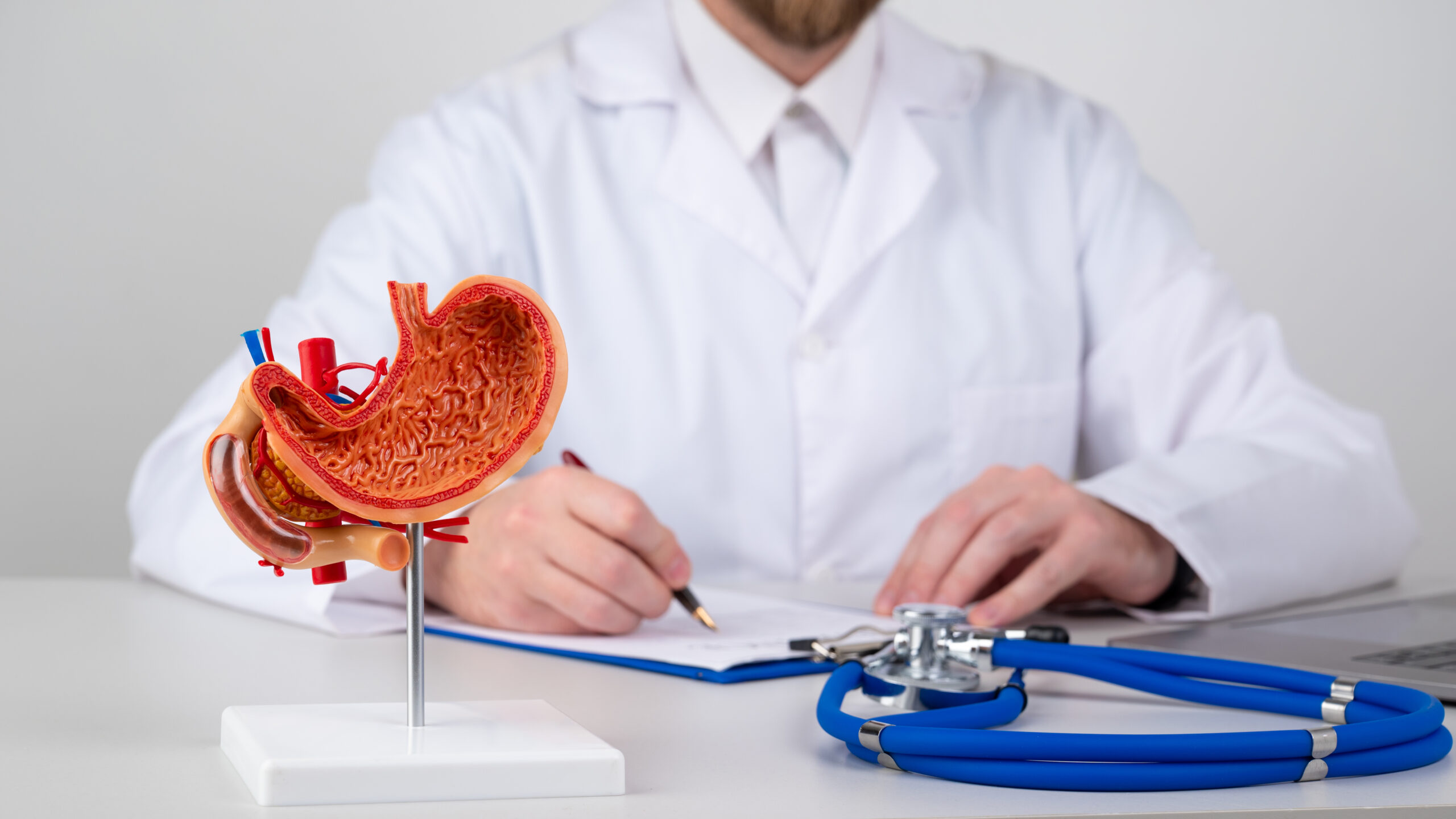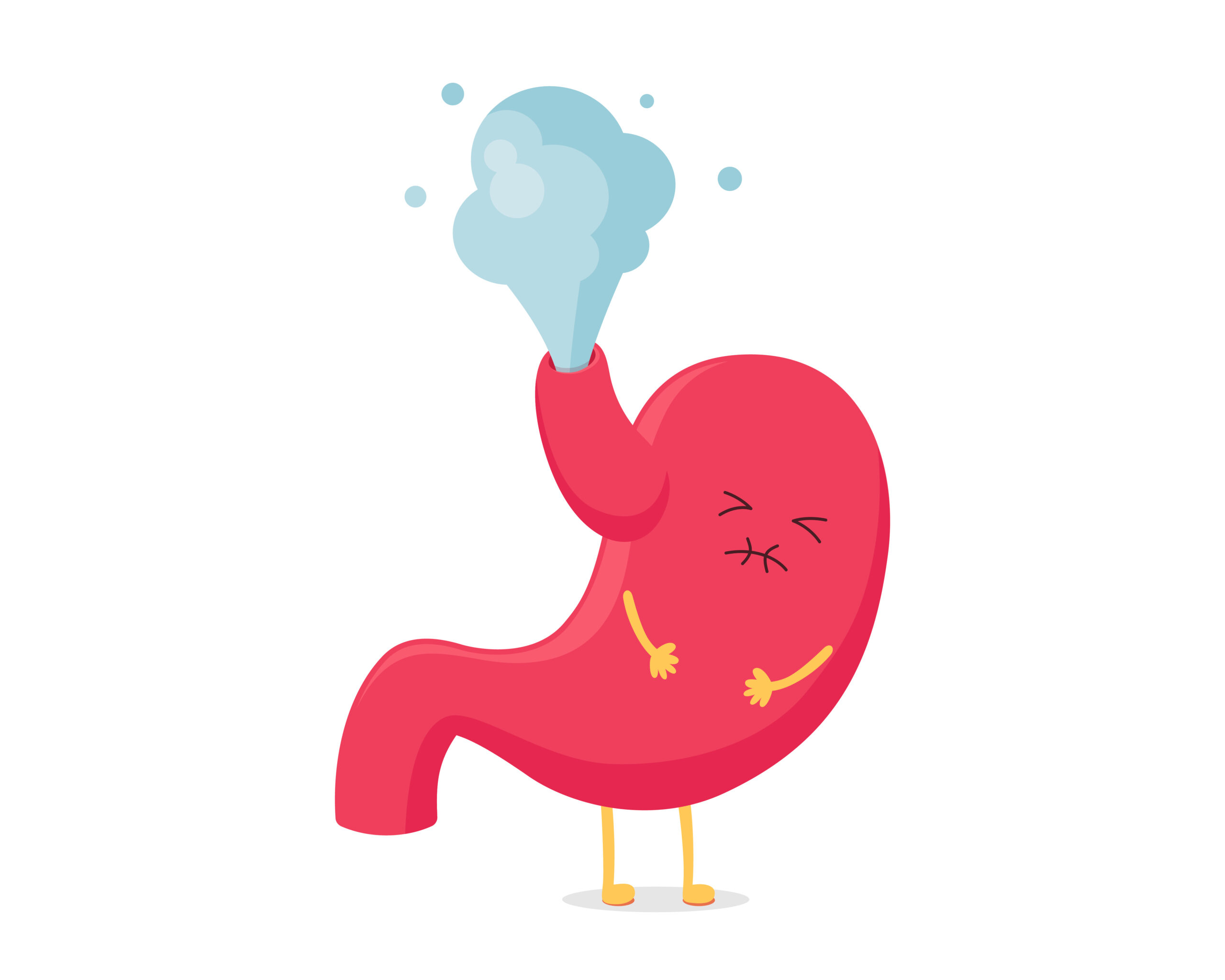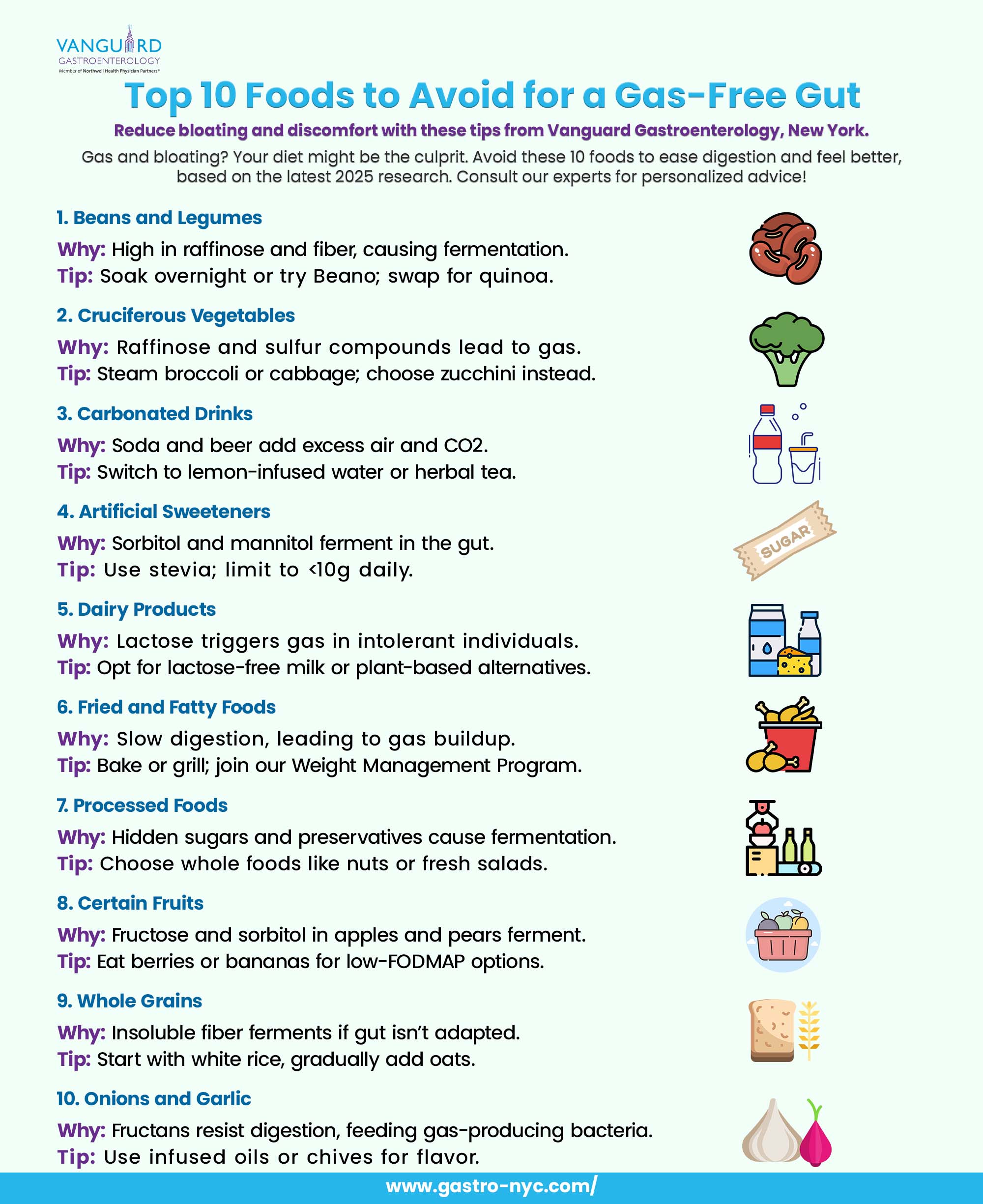
Difference Between Gastrologist and Gastroenterologist
June 19, 2023
Insurance Accepted at Vanguard Gastroenterology
June 21, 2023Top 10 Gas-Causing Foods to Avoid for Better Digestive Comfort | Vanguard Gastroenterology

Lorem ipsum dolor sit amet, consectetur adipiscing elit, sed do eiusmod tempor incididunt ut labore et dolore magna aliqua. Ut enim ad minim veniam, quis nostrud exercitation ullamco laboris nisi ut aliquip ex ea commodo consequat. Duis aute irure dolor in reprehenderit in voluptate velit esse cillum dolore eu fugiat nulla pariatur. Excepteur sint occaecat cupidatat non proident, sunt in culpa qui officia deserunt mollit anim id est laborum.
The Science Behind Gas-Causing Foods

Gas forms primarily from swallowed air and the fermentation of undigested foods in the colon. Foods rich in fermentable oligosaccharides, disaccharides, monosaccharides, and polyols (FODMAPs) are prime offenders, as they resist digestion in the small intestine and feed gut bacteria. A 2025 study on dietary patterns found that carb-heavy meals can exacerbate postprandial distress syndrome (PDS), including bloating, compared to protein-rich options. High-fiber foods, while nutritious, can also contribute if introduced too quickly, as they increase fermentation.
At Vanguard Gastroenterology, we recommend a personalized approach. For example, if you're prone to bloating, a low-FODMAP diet—proven effective in a 2024 update on abdominal bloating—can provide relief by limiting these fermentable carbs. This isn't about elimination but moderation, ensuring you maintain essential nutrients for overall wellness.
Vanguard Gastroenterology's Top 10 Foods to Avoid for Gas Relief
Based on our experience treating thousands of patients and aligned with recent insights from sources like the Cleveland Clinic and Mayo Clinic, here are the most common gas-causing foods. We've included why they trigger symptoms and practical tips to swap them out.
- Beans and Legumes: Packed with raffinose and soluble fiber, beans like lentils, chickpeas, and kidney beans ferment in the large intestine, producing methane and hydrogen. A 2025 guide notes they're a top culprit for bloating. Tip: Soak overnight or try Beano enzymes; opt for smaller portions or alternatives like quinoa.
- Cruciferous Vegetables: Broccoli, cauliflower, cabbage, Brussels sprouts, and bok choy contain raffinose and sulfur compounds that lead to foul-smelling gas. Harvard Health's 2024 tips confirm their role in bloating. Tip: Steam instead of eating raw to ease digestion; substitute with low-FODMAP veggies like zucchini or carrots.
- Carbonated Drinks: Sodas, sparkling water, and beer introduce excess air and CO2, exacerbating bloating. Mayo Clinic lists them as a primary cause. Tip: Switch to still water infused with lemon or herbal teas for hydration without the fizz.
- Artificial Sweeteners: Sorbitol, mannitol, and xylitol in sugar-free gums, candies, and diet sodas ferment poorly, causing gas. A 2023 AARP report highlights their incomplete digestion in the small intestine. Tip: Choose natural sweeteners like stevia; limit to under 10g daily.
- Dairy Products: Lactose in milk, cheese, and ice cream can overwhelm those with low lactase enzymes, leading to fermentation. IFFGD notes this affects many adults as enzyme levels decline with age. Tip: Try lactose-free options or plant-based milks; lactase supplements can help.

6. Fried and Fatty Foods: High-fat items like french fries and burgers slow digestion, allowing more time for gas buildup. Vanguard's Weight Management Program often addresses this for patients with persistent issues.
7. Processed Foods: Snacks like chips, cereals, and dressings often hide added sugars, fructose, and preservatives that ferment. Recent microbiome research links them to increased gas production. Tip: Read labels; choose whole-food alternatives like nuts or fresh salads.
8. Certain Fruits: Apples, pears, peaches, and prunes are high in fructose and sorbitol, which pull water into the intestines and ferment. Tip: Opt for lower-FODMAP fruits like berries or bananas; eat in moderation.
9. Whole Grains: Oats, quinoa, brown rice, and wheat contain insoluble fiber that ferments if your gut isn't adapted. A 2025 study suggests gradual introduction to avoid PDS. Tip: Start with white rice (gas-free per IFFGD) and slowly add whole grains.
10. Onions and Garlic: Rich in fructans, these alliums resist digestion and feed gas-producing bacteria. Medical News Today confirms their bloating potential. Tip: Use infused oils for flavor without the fibers; alternatives like chives work well.
Practical Steps to Adjust Your Diet and Reduce Gas
Reducing gas isn't just about avoidance—it's about smart swaps and habits. At Vanguard Gastroenterology, we guide patients through these evidence-based strategies:
- Track Your Triggers: Use a food diary app to log meals and symptoms, identifying personal sensitivities.
- Embrace Low-FODMAP: A 2024 study reaffirms its efficacy for IBS-related bloating; start with a two-week trial under supervision.
- Balance Protein and Carbs: New 2025 research shows protein-rich diets may reduce bloating compared to carb-heavy ones. Incorporate lean meats, eggs, or tofu.
- Cook Smarter: Boiling or steaming breaks down fibers; avoid raw veggies if sensitive.
- Hydrate and Move: Drink 8-10 glasses of water daily and walk after meals to aid motility.
- Probiotic Support: Consider yogurt or supplements to nurture beneficial gut bacteria, as microbiome imbalances amplify gas.
If symptoms persist, it could signal underlying issues like SIBO or IBS. Our screening colonoscopies help detect and prevent complications early.
Conclusion
Excessive gas and bloating can disrupt your daily life, but making informed dietary adjustments can bring significant relief. By avoiding or moderating gas-causing foods like beans, cruciferous vegetables, and carbonated drinks, and adopting smart eating habits, you can support your digestive health and feel more comfortable. At Vanguard Gastroenterology, we combine cutting-edge research with personalized care to help you navigate these challenges. Our expertise, backed by 2025 studies on gut health and microbiome balance, ensures you get practical, evidence-based solutions tailored to your needs. Don’t let gas hold you back—take control of your digestive wellness today.
Call to Action
Struggling with persistent gas or bloating? Let Vanguard Gastroenterology in New York help you find relief with expert consultations and tailored dietary plans. Schedule your appointment today to start your journey to better digestive health! Visit our blog for more insights: or call us now to book your consultation.
Frequently Asked Questions (FAQs)
Q2. What are common symptoms of gas and bloating?
Symptoms include abdominal fullness, cramping, belching, flatulence, and distention. Severe cases may mimic other conditions, so monitor for persistence.
Q3. Can avoiding gas-causing foods completely eliminate gas and bloating?
No, some gas is normal, but moderation can significantly reduce it. Complete elimination might deprive you of nutrients, so balance is key.
Q4. How long does it take to notice a difference after adjusting my diet?
Many see improvements in 3-7 days, but full adaptation to changes like low-FODMAP can take 2-4 weeks, according to 2025 guidelines.
Q5. Should I consult a specialist for persistent gas and bloating issues?
Yes, if symptoms last over two weeks or include pain, weight loss, or blood in stool, see a gastroenterologist to rule out conditions like IBS or cancer.
Q6. How does the gut microbiome influence gas production?
The microbiome's bacteria ferment undigested foods, producing gases. Imbalances (dysbiosis) can worsen this; a 2025 review links diverse microbiomes to less gas.
Q7. What role do FODMAPs play in causing bloating?
FODMAPs draw water into the intestines and ferment, leading to gas and distention. Low-FODMAP diets, updated in 2024 studies, effectively manage this for many.



